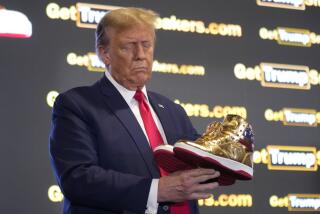Commentary: Gordon Gekko may be a problem for Mitt Romney
âItâs thrilling left-wing trash,â Village Voice critic David Edelstein ended his review of Oliver Stoneâs âWall Street,â âand itâs more or less disposable.â
Thrilling (at times), left-wing (I guess), trash (not entirely), the movie Oliver Stone began shooting in lower Manhattan 25 years ago this month has proved anything but disposable. âWall Streetâ remains one of the few Hollywood business yarns to lodge itself in our national memory, and, in the character of flamboyant corporate raider Gordon Gekko, portrayed with vulpine, Oscar-winning gusto by Michael Douglas, has added a remarkably durable archetype to American mythology â the personification of capital.
Douglas was recently featured in an FBI public service ad meant to discourage insider trading: âThe movie was fiction,â Douglas maintained, âthe problem is real.â Until recently the swank W New York Downtown hotel encouraged its guests to âunleash their inner Gordon Gekkoâ â an invitation modified last fall after it was revealed that two leaders of Occupy Wall Street had abandoned Zuccotti Park for those luxurious digs. More recently, Greg Smith, the trader who blew the whistle on Goldman Sachs, was hailed as the ânon Gordon Gekko.â And then, there is the rhetoric of the presidential campaign and the persona of candidate Mitt Romney.
Actually, âWall Streetâ â which Stone co-wrote with his frequent collaborator Stanley Weiser â was a buzz generator from the moment 20th Century Fox announced it. Coming off best picture and director Oscars for âPlatoon,â Stoneâs latest was hyped as a new kind of war film that, the Los Angeles Times predicted, would âmake the airstrip at Khe Sanh look like Club Med.â Stone was himself a stockbrokerâs son. No less than âPlatoon,â the story was personal and nothing if not ambitious (the movie was first known, with a nod to Erich von Stroheim, as âGreedâ). âWall Streetâ intended to lay waste to the rampant speculation and excesses of the Reagan boom.
With miraculous timing, it was released in December 1987, less than two months after Black Monday saw the Dow nose dive 508 points and a week before arbitrageur Ivan Boesky was fined $100 million and sentenced to prison for inside trading. Both detractors and proponents called âWall Streetâ a documentary.
Some at the preview thought the masses wouldnât get âWall Streetâ â it was too arcane and too âNew York.â In fact, despite mixed reviews, the movie proved to be a moderate hit, finishing 26th for 1987 with grosses of $44 million. And by the time Douglas won his Oscar, it had assumed its position in the zeitgeist, alongside Tom Wolfeâs bestselling âBonfire of the Vanities,â as the final word on the boom-boom â80s.
No doubt that âWall Street,â which opens like an episode from the first season of âMad Menâ with Sinatra swinging âFly Me to the Moon,â has dated. The movie unfolds in a world of cramped cubicles and clunky green computer terminals, but its conflict is timeless. As in âPlatoon,â an unformed American boy played by Charlie Sheen (who 20 years later would become the poster child for another sort of excess), here named Bud, is caught between good and bad fathers. The good dad is a salt-of-the-earth machinist and union rep (Martin Sheen), the bad one is Gordon Gekko, all slicked-back hair, red suspenders and outrageous sneering pronouncements: âLunch is for wimps.â A downsizer and a union buster who refers to his trusted assistant as the Terminator, this guy doesnât need lunch, this carnivore devours entire companies.
Gekko was at once the genius of the system, exhibiting what Karl Marx called capitalâs âwerewolf-like hunger for surplus labor,â and a new version of the Ugly American. But not everyone was scared. By January 1988, New York Newsday reported that Gekkoâs outfit offered a new âlook for the successful manâ; 22 years later, a fashion writer for the Washington Post imagined that this peacock was something of a drag act, âthe 1980s boom years required women to look like curvy Gordon Gekkos.â
âWall Streetâ made Douglas a hero on the real Wall Street; by his own account, he was high-fived in his travels through haute Manhattan. These accolades would eventually grow old (years later, the actor told the New York Times how pleased heâd be to never have another âdrunken Wall Street broker come up to me and say, âYouâre the man!ââ) but, in 1988, the actor fully identified with the character: âI donât think Gekkoâs a villain. Doesnât beat his wife or his kid. Heâs just taking care of business. And he gives a lot of people chances.â
Stone was more equivocating. (âI think of âWall Streetâ as a âScarfaceâ of business,â he wrote in 2000, with âGekko replacing Tony Montana.â) But, as with Tony and, as in âParadise Lost,â the Devil got the best lines. Gekkoâs infamous âgreed is goodâ speech combines a warning against Americaâs decline with an attack on unaccountable, overpaid corporate managers, arguing that in a system that promotes âsurvival of the unfittest,â naked self-interest is an evolutionary positive. Gekko later elaborates, telling his protĂŠgĂŠ Bud that the richest 1% in America control half the wealth and make the rules: âYouâre not naive enough to think weâre living in a democracy?â Thus did the movieâs arch capitalist offer the movieâs most stinging attack on capitalism.
Consequently, Gekko has always been regarded with ambivalence. At first, he was seen as a bona-fide movie monster. Yet, by the time that the economy turned around in the mid â90s, comparison to Gekko in competitive fields became almost complimentary. New York Knicks coach Pat Reilly was admired for his Gekko drive (and Gekkonian look). With his cigars and bling, the pre-gubernatorial Arnold Schwarzenegger was characterized as âTony Soprano meets Gordon Gekko.â
Twenty years after âWall Streetâ went into production, in the midst of another bull market, Fox announced a sequel allowing Gekko to âresume his machinations on a global scale.â Stone declined to revisit his greatest creation but with the crash of 2008 he changed his mind. âWall Street: Money Never Sleepsâ found Gekko released from prison and flacking his memoir with a batch of new homilies: âGreed got too greedy,â âSpeculation is the mother of all evil.â This time, the bad guy was Josh Brolin, a cardboard stand-in for Goldman Sachs, given the fatal words, âWeâre Too Big To Fail.â In a switch not unlike that in the 1945 âHouse of Dracula,â wherein the Wolf Man turns good and helps rid the world of Dracula and the Frankenstein monster, Gekko emerged as the clearsighted prophet of doom.
Critics found âWall Street 2â a less compelling movie than the documentary âInside Jobâ or the indie financial noir âMargin Call,â but Gekko has remained the go-to personification of our economic system â invoked in the Nation as the essence of capitalist rapacity or excoriated by National Review for providing the talking points for an Occupy Wall Street ârant.â In American popular culture, to talk about capitalism is to talk about Gekko and to talk about Gekko is, these days, to invoke the presidential candidate and multimillionaire private equity investor Mitt Romney, whose unavoidably Gekko-istic career with Bain Capital has been savaged from both right and left.
No one has accused Romney of criminal behavior â itâs something about the system (and perhaps his square jaw and coiffure). Late last year, the liberal organization Americans United for Change created a website called âRomney-Gekko 2012â; in February, the super PAC supporting Romneyâs conservative rival Newt Gingrich financed the partisan documentary âWhen Mitt Romney Came to Town,â showing the human cost of Bainâs profit-taking investments. Romney has helped opponents by compulsively unleashing his inner Gekko, flaunting his moola while making tone-deaf assertions regarding the satisfaction of firing âpeople who provide services to meâ and praising the âcreative destructionâ that would have allowed General Motors to go into bankruptcy.
Rampant anti-Gekkoism is a problem for Romney. But so is the disconnect between the realistic business practices that made him a quarter-billionaire and his desire that people like him for it. Gekko was a realist who made no excuses and never pretended to be anything other than a risk-taking buccaneer. Playing it safe, Romney strives to give Americaâs most beloved villain a human face. Would even Bud have trusted that?
More to Read
The biggest entertainment stories
Get our big stories about Hollywood, film, television, music, arts, culture and more right in your inbox as soon as they publish.
You may occasionally receive promotional content from the Los Angeles Times.










